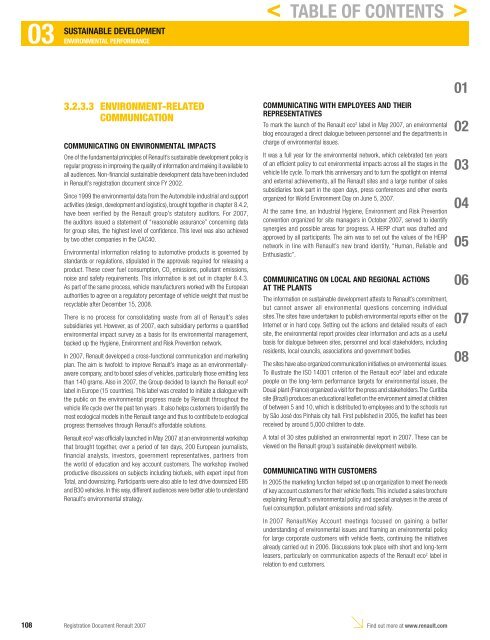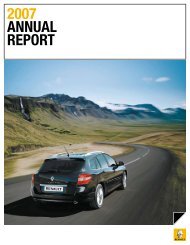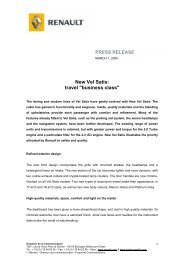2007 Interactive Registration Document - Renault
2007 Interactive Registration Document - Renault
2007 Interactive Registration Document - Renault
You also want an ePaper? Increase the reach of your titles
YUMPU automatically turns print PDFs into web optimized ePapers that Google loves.
03 ENVIRONMENTAL<br />
SUSTAINABLE DEVELOPMENT<br />
PERFORMANCE<br />
3.2.3.3 ENVIRONMENT-RELATED<br />
COMMUNICATION<br />
COMMUNICATING ON ENVIRONMENTAL IMPACTS<br />
One of the fundamental principles of <strong>Renault</strong>’s sustainable development policy is<br />
regular progress in improving the quality of information and making it available to<br />
all audiences. Non-fi nancial sustainable development data have been included<br />
in <strong>Renault</strong>’s registration document since FY 2002.<br />
Since 1999 the environmental data from the Automobile industrial and support<br />
activities (design, development and logistics), brought together in c hapter 8.4.2,<br />
have been verified by the <strong>Renault</strong> group’s statutory auditors. For <strong>2007</strong>,<br />
the auditors issued a statement of “reasonable assurance” concerning data<br />
for group sites, the highest level of confi dence. This level was also achieved<br />
by two other companies in the CAC40.<br />
Environmental information relating to automotive products is governed by<br />
standards or regulations, stipulated in the approvals required for releasing a<br />
product. These cover fuel consumption, CO 2 emissions, pollutant emissions,<br />
noise and safety requirements. This information is set out in c hapter 8.4.3.<br />
As part of the same process, vehicle manufacturers worked with the European<br />
authorities to agree on a regulatory percentage of vehicle weight that must be<br />
recyclable after December 15, 2008.<br />
There is no process for consolidating waste from all of <strong>Renault</strong>’s sales<br />
subsidiaries yet. However, as of <strong>2007</strong>, each subsidiary performs a quantifi ed<br />
environmental impact survey as a basis for its environmental management,<br />
backed up the Hygiene, Environment and Risk Prevention network.<br />
In <strong>2007</strong>, <strong>Renault</strong> developed a cross-functional communication and marketing<br />
plan. The aim is twofold: to improve <strong>Renault</strong>’s image as an environmentallyaware<br />
company, and to boost sales of vehicles, particularly those emitting less<br />
than 140 grams. Also in <strong>2007</strong>, the Group decided to launch the <strong>Renault</strong> eco²<br />
label in Europe (15 countries). This label was created to initiate a dialogue with<br />
the public on the environmental progress made by <strong>Renault</strong> throughout the<br />
vehicle life cycle over the past ten years . It also helps customers to identify the<br />
most ecological models in the <strong>Renault</strong> range and thus to contribute to ecological<br />
progress themselves through <strong>Renault</strong>’s affordable solutions.<br />
<strong>Renault</strong> eco² was offi cially launched in May <strong>2007</strong> at an environmental workshop<br />
that brought together, over a period of ten days, 200 European journalists,<br />
financial analysts, investors, government representatives, partners from<br />
the world of education and key account customers. The workshop involved<br />
productive discussions on subjects including biofuels, with expert input from<br />
Total, and downsizing. Participants were also able to test drive downsized E85<br />
and B30 vehicles. In this way, different audiences were better able to understand<br />
<strong>Renault</strong>’s environmental strategy.<br />
< TABLE OF CONTENTS ><br />
COMMUNICATING WITH EMPLOYEES AND THEIR<br />
REPRESENTATIVES<br />
To mark the launch of the <strong>Renault</strong> eco2 label in May <strong>2007</strong>, an environmental<br />
blog encouraged a direct dialogue between personnel and the departments in<br />
charge of environmental issues.<br />
It was a full year for the environmental network, which celebrated ten years<br />
of an effi cient policy to cut environmental impacts across all the stages in the<br />
vehicle life cycle. To mark this anniversary and to turn the spotlight on internal<br />
and external achievements, all the <strong>Renault</strong> sites and a large number of sales<br />
subsidiaries took part in the open days, press conferences and other events<br />
organized for World Environment Day on June 5, <strong>2007</strong>.<br />
At the same time, an Industrial Hygiene, Environment and Risk Prevention<br />
convention organized for site managers in October <strong>2007</strong>, served to identify<br />
synergies and possible areas for progress. A HERP chart was drafted and<br />
approved by all participants. The aim was to set out the values of the HERP<br />
network in line with <strong>Renault</strong>’s new brand identity, “Human, Reliable and<br />
Enthusiastic”.<br />
COMMUNICATING ON LOCAL AND REGIONAL ACTIONS<br />
AT THE PLANTS<br />
The information on sustainable development attests to <strong>Renault</strong>’s commitment,<br />
but cannot answer all environmental questions concerning individual<br />
sites. The sites have undertaken to publish environmental reports either on the<br />
Internet or in hard copy. Setting out the actions and detailed results of each<br />
site, the environmental report provides clear information and acts as a useful<br />
basis for dialogue between sites, personnel and local stakeholders, including<br />
residents, local councils, associations and government bodies.<br />
The sites have also organized communication initiatives on environmental issues.<br />
To illustrate the ISO 14001 criterion of the <strong>Renault</strong> eco² label and educate<br />
people on the long-term performance targets for environmental issues, the<br />
Douai plant (France) organized a visit for the press and stakeholders. The Curitiba<br />
site (Brazil) produces an educational leafl et on the environment aimed at children<br />
of between 5 and 10, which is distributed to employees and to the schools run<br />
by São José dos Pinhais city hall. First published in 2005, the leafl et has been<br />
received by around 5,000 children to date.<br />
A total of 30 sites published an environmental report in <strong>2007</strong>. These can be<br />
viewed on the <strong>Renault</strong> group’s sustainable development website.<br />
COMMUNICATING WITH CUSTOMERS<br />
In 2005 the marketing function helped set up an organization to meet the needs<br />
of key account customers for their vehicle fl eets. This included a sales brochure<br />
explaining <strong>Renault</strong>’s environmental policy and special analyses in the areas of<br />
fuel consumption, pollutant emissions and road safety.<br />
In <strong>2007</strong> <strong>Renault</strong>/Key Account meetings focused on gaining a better<br />
understanding of environmental issues and framing an environmental policy<br />
for large corporate customers with vehicle fl eets, continuing the initiatives<br />
already carried out in 2006. Discussions took place with short and long-term<br />
leasers, particularly on communication aspects of the <strong>Renault</strong> eco 2 label in<br />
relation to end customers.<br />
108 <strong>Registration</strong> <strong>Document</strong> <strong>Renault</strong> <strong>2007</strong><br />
Find out more at www.renault.com<br />
01<br />
02<br />
03<br />
04<br />
05<br />
06<br />
07<br />
08




